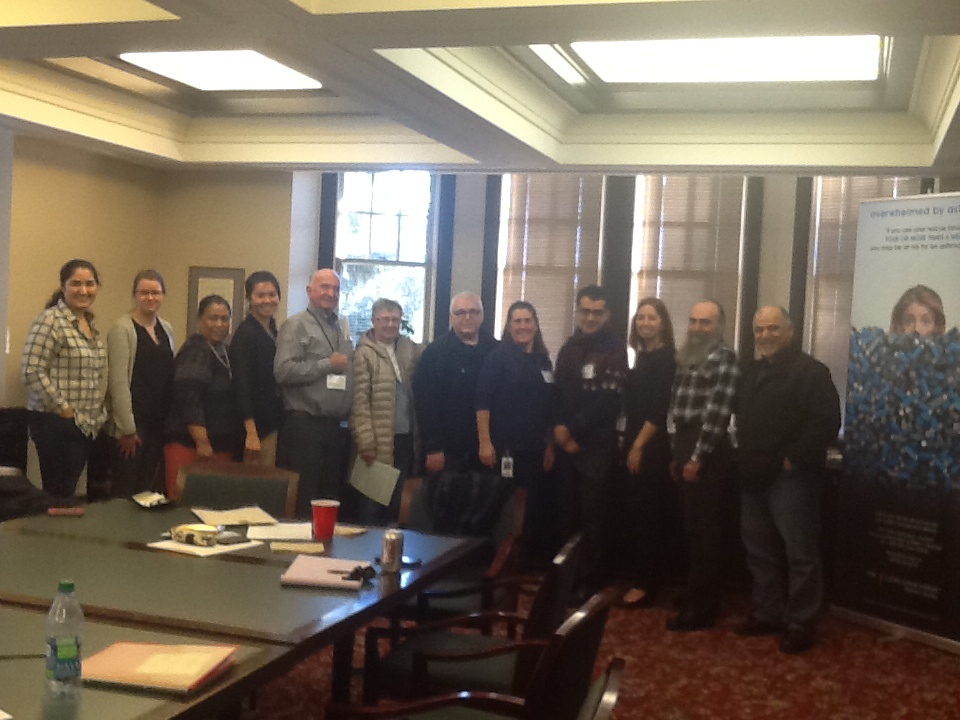
THE UNIVERSITY OF BRITISH COLUMBIA

THE UNIVERSITY OF BRITISH COLUMBIA
On January 19th, 2015, the Institute for Heart and Lung Health, University of British Columbia, held a Patient Advisory Committee (PAC) meeting at the BC Lung Association building located at 2675 Oak Street, Vancouver, BC. The meeting was called to order at 12:30 by the moderator, Roxanne Rousseau. The meeting featured a round table discussion involving patients and health care professionals having an interest in respiratory disease and improving patient engagement surrounding prevention, diagnosis, and management of Chronic Obstructive Pulmonary Disease (COPD).
Committee Members: J. Epp; S. Lavigne; M. Lavigne; G. Greenan; E. Woo
Research Community Stakeholders:
Kelly Ablog-Morrant, Director, Lung Health Initiatives, BC Lung Association; Roxanne Rousseau, Research Coordinator, University of British Columbia;
Sophia Underhill, Research Assistant, University of British Columbia;
Laura Nimmon, Postdoctoral Fellow, Centre for Health Education Scholarship;
Mark FitzGerald, Physician and Scientist, University of British Columbia;
Iraj Poureslami, Scientist, University of British Columbia;
Mohsen Sadatsafavi, Scientist, University of British Columbia;
Stirling Bryan, Director, Centre for Clinical Epidemiology and Evaluation, UBC;
Jessica Shum, Research Assistant, University of British Columbia
Iran Seyed-Raeisy, Social Scientist, University of British Columbia
Introduction and opening remarks by Roxanne Rousseau were presented after a light lunch. Participants explained their interest(s) and/or role (s)/ or relationship with Chronic Obstructive Pulmonary Disease (COPD) followed by medical experiences and individual’s engagement with COPD research. Key points of the discussion from the person(s) living with COPD included 1. ways to improve quality of life; 2. a better understanding of the drugs used to treat COPD; and 3. having more information on COPD readily available that would help to manage the disease. For example, one PAC member remarked on, “How can we identify those with COPD earlier instead of waiting for major health problems to occur. Key points from the discussion from the medical research community included ways to 1. bring patient’s voices into decisions at the treatment level and at the service level; 2. involve patient’s in their own care; and 3. engage patients in the development of educational materials on COPD. For example a scientist at the meeting suggested that an action plan could help patient’s feel more included in developing their own plan. Conversely, one patient at the meeting had never received an action plan or been granted opportunity to be involved in developing their own action plan in a way that suited them and their lifestyle.
Patients want to feel special, taken care of, and equal. They want to be on common ground with doctors, especially in regards to language. Patient care has to start at the beginning (the hospital, the doctor’s office, the place of diagnosis), and be built on strong connections, genuine encouragement, and support. Following the initial diagnosis, there needs to be a follow up process, in which patients are provided information about managing their condition and programs available to them, and given the opportunity to speak face to face with specialists, ask questions, and develop an action plan together. Specific recommendations included:
1.Develop a portal where COPD patients could gather information about their condition, and pose questions they have (one patient is accessing information through the McGill website, pointing to the need for information closer at hand);
2.Identify some benchmarks or questionnaires / checklists that could be used to measure health in COPD patients, and even to help diagnose COPD patients earlier – e.g. lung function test; shortness of breath questions;
3.Ensure that action plans are provided to each COPD patient, and that they are developed in collaboration with the patient.